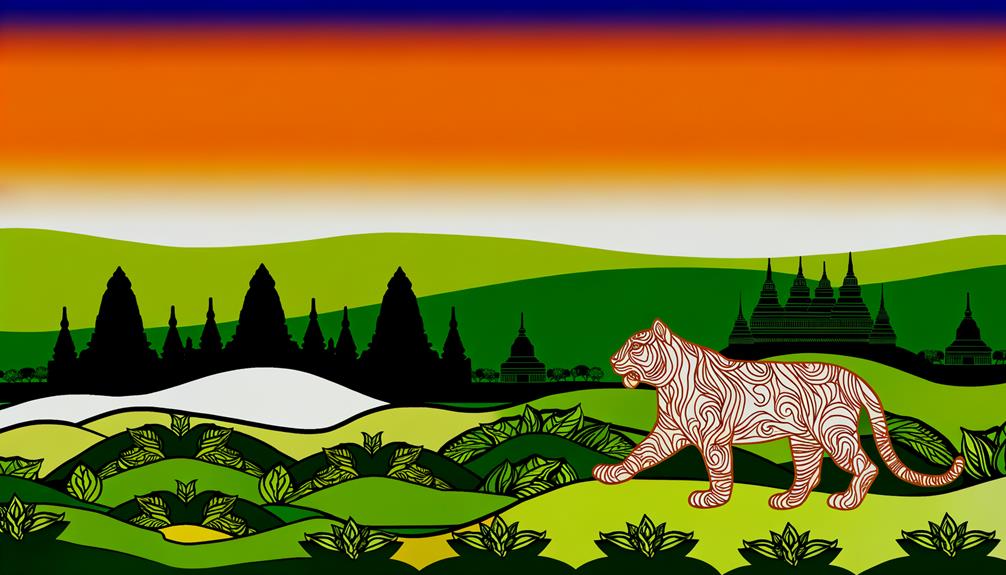Bharat Name Meaning in English
The name 'Bharat,' originating from ancient Sanskrit texts, translates to 'to bear' or 'to carry.' It appears extensively in Indian epic narratives like the Mahabharata and Ramayana. Historically linked to King Bharata, the name signifies unity, sovereignty, and cultural heritage.
In ancient scriptures such as the Rigveda and the Puranas, Bharat encapsulates the essence of the land known as Bharatavarsha, reflecting India's profound spiritual and philosophical traditions. The term evokes a deep sense of national pride and identity, continuing to symbolize the country's enduring spirit and rich legacy.
Discover the deeper layers of this culturally significant name.

Key Takeaways
- Bharat means 'to bear' or 'to carry' in Sanskrit.
- The name Bharat is derived from ancient Indian scriptures, including the Mahabharata and Puranas.
- Bharat symbolizes unity, sovereignty, and India's rich cultural heritage.
- The name Bharat has mythological significance linked to King Bharata from Indian epics.
- Bharat reflects the nation's enduring spirit, diversity, and profound philosophical contributions.
Etymology of Bharat
The name 'Bharat' finds its roots in ancient Sanskrit texts, where it is attributed to the legendary King Bharata, a prominent figure in Indian mythology and history.
Etymologically, 'Bharat' is derived from the Sanskrit verb 'bhṛ,' meaning 'to bear' or 'to carry'. This reflects the king's role as a bearer of the nation's values and culture.
The term also appears in seminal Indian literature such as the Mahabharata and the Puranas, symbolizing the unity and continuity of the Indian subcontinent.
The cultural significance of the name extends beyond mythology, as it encapsulates the ethos of a civilization that has flourished for millennia, emphasizing values like unity, sovereignty, and cultural heritage.
Historical Context
The name 'Bharat' finds its earliest mentions in ancient texts such as the Rigveda and the Mahabharata, where it is used to denote a land of cultural and spiritual significance.
Over centuries, the term has evolved to encapsulate the essence of Indian identity, reflecting a rich tapestry of traditions, philosophies, and values.
Additionally, its mythological roots, particularly the association with King Bharata, underscore its enduring legacy in Indian culture and history.
Ancient Textual References
Dating back to ancient Indian scriptures, the name 'Bharat' finds its origins in the epic narratives and historical texts that have shaped the cultural and spiritual landscape of the region.
Mentioned in the Rigveda, one of the oldest texts, 'Bharat' refers to the descendants of King Bharata, a legendary ruler whose dynasty formed a significant part of Indian lore.
The Mahabharata, another seminal epic, further solidifies this connection, portraying Bharata as a symbol of unity and governance.
The name also appears in the Puranas, which describe an ancient land known as Bharatavarsha.
These references underscore the deep historical roots and enduring legacy of the name, reflecting its importance in the collective consciousness and identity of the Indian subcontinent.
Cultural Significance Evolution
As Indian civilization evolved through various historical epochs, the name 'Bharat' continuously adapted, reflecting the dynamic cultural and socio-political transformations of the region.
Initially rooted in Vedic literature, 'Bharat' symbolized a unified cultural identity amidst diverse tribal societies.
During the Gupta Empire, the term gained prominence, symbolizing a golden age of prosperity and cultural renaissance.
The medieval era saw 'Bharat' becoming a rallying point for resisting foreign invasions, thereby embedding it with notions of sovereignty and resilience.
By the time of the British colonial period, 'Bharat' evolved into a symbol of nationalistic fervor, representing the collective aspiration for independence.
These historical adaptations underscore 'Bharat' as a term deeply intertwined with India's enduring quest for identity and unity.
Mythological Connections
Interwoven with the rich tapestry of Hindu mythology, the name 'Bharat' traces its origins to ancient epics like the Mahabharata and the Ramayana, where it is deeply emblematic of the region's spiritual and cultural heritage. The name is derived from King Bharata, an ancestor of the Pandavas in the Mahabharata, symbolizing unity and sovereignty. Furthermore, Bharata, brother of Lord Rama in the Ramayana, represents loyalty and devotion.
| Source | Significance |
|---|---|
| Mahabharata | King Bharata, ancestor of Pandavas |
| Ramayana | Bharata, brother of Lord Rama |
| Spiritual Texts | Emblematic of unity and sovereignty |
| Cultural Heritage | Deeply ingrained in cultural consciousness |
| Historical Usage | Continuously used in various historical contexts |
Understanding these mythological connections enriches the appreciation of 'Bharat' as more than just a name, but a symbol of enduring cultural identity.
Cultural Significance
The name 'Bharat' holds profound cultural significance in India, deeply rooted in the nation's historical and mythological narratives.
Historically, 'Bharat' traces back to the ancient Bharata tribe, a prominent group mentioned in Vedic texts. The term also honors King Bharata, an esteemed figure in Hindu epics who symbolizes righteous governance and unity.
Culturally, 'Bharat' embodies the Indian ethos, reflecting values of spiritual wisdom, resilience, and national identity. It transcends mere nomenclature, representing a civilization's continuity and the collective consciousness of its people.
Therefore, 'Bharat' is more than a name; it's a tribute to India's rich heritage and enduring spirit, resonating deeply within its diverse cultural landscape.
Usage in Literature
Bharat's profound cultural significance is also vividly reflected in Indian literature, where the name appears frequently in epic narratives, classical poetry, and modern works, symbolizing the nation's enduring spirit and identity.
This evocative term has been used to evoke the following themes:
- Epic Narratives: In texts like the Mahabharata and Ramayana, Bharat is depicted as a land of moral and ethical quests.
- Classical Poetry: Verses by poets like Kalidasa employ Bharat to symbolize natural beauty and cultural richness.
- Modern Literature: Contemporary authors use Bharat to explore the complexities of national identity and societal change.
Such literary representations underscore Bharat's multifaceted role in shaping India's historical and cultural consciousness, deeply embedding the name in the nation's literary heritage.
Bharat in Modern Times
In contemporary India, the name Bharat resonates with a deep sense of national pride and cultural continuity, reflecting the country's historical legacy and evolving identity.
Rooted in ancient texts like the Mahabharata and Puranas, Bharat embodies the civilizational ethos that predates colonial influences.
In modern times, this name serves as a symbol of unity and resilience amid India's diverse linguistic, religious, and cultural landscape.
Government institutions, educational frameworks, and public discourse frequently employ Bharat to emphasize sovereign independence and historical continuity.
Additionally, the term invokes a collective consciousness that bridges the ancient with the modern, fostering a renewed appreciation for India's rich heritage while embracing progressive ideals.
Therefore, Bharat remains a crucial, living testament to India's enduring spirit.
Comparative Linguistics
Exploring the name Bharat through the lens of comparative linguistics reveals how its etymology and usage across different languages underscore the cultural and historical significance attributed to it. This ancient name, rooted in Sanskrit, has parallels and variations in several languages, reflecting India’s profound influence. The term “Bharat” is often associated with the legendary king Bharata, who is celebrated in Indian mythology and literature, symbolizing unity and sovereignty. Delving deeper, the bharath name meaning explained encompasses more than just a geographical identity; it evokes a sense of cultural heritage and pride that resonates with millions. As such, understanding this name serves as a gateway to appreciating the diverse linguistic tapestry and shared history that binds the people of India together.
- Sanskrit Origin: Derived from the term 'Bharata', the name signifies 'to be maintained' or 'to be cherished'.
- Historical Context: In classical literature, Bharat refers to an ancient Indian king, whose legacy solidified the name's prominence.
- Cross-Linguistic Presence: Variants like 'Bharatam' in Tamil and 'Bharoto' in Bengali illustrate the name's adaptation and integration into regional dialects.
These linguistic connections highlight the enduring relevance and rich heritage of Bharat across diverse cultures.
Symbolism and Identity
The name Bharat encapsulates deep symbolism and identity, serving as a cultural touchstone that embodies the essence of Indian civilization and its values.
Historically, the name traces its roots to ancient texts, especially the Mahabharata and the Vishnu Purana, where it signifies the vast subcontinent ruled by the legendary King Bharata. This moniker reflects India's rich heritage, representing unity, diversity, and resilience.
In a contemporary context, Bharat evokes pride and a sense of belonging among its citizens, emphasizing their shared history and cultural legacy. The name is more than a geographical identifier; it is a tribute to India's enduring spirit and a reminder of its profound philosophical and spiritual contributions to the world.
Conclusion
The term 'Bharat' encapsulates a rich tapestry of historical, cultural, and linguistic significance. Rooted in ancient texts and historical narratives, it reflects the enduring identity and heritage of the Indian subcontinent.
While some may argue that its usage in a modern, globalized context is anachronistic, the term's deep cultural resonance and symbolic value continue to reinforce a collective national identity.
Consequently, 'Bharat' remains a potent emblem of continuity and cultural pride across generations.






